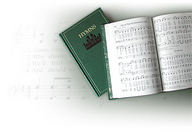Appropriate Music for Sacrament Meetings
Music in a Worship Services of The Church of Jesus Christ of Latter-day Saints
by W. Herbert Klopfer

We are commanded to worship the true and living God in sacrament meeting by partaking of the sacrament, renewing covenants, building spirituality, and receiving gospel instructions. Appropriate music will enhance the spirit of reverent worship. Music in sacrament meetings "should be worshipful, faith-promoting, and gospel oriented: General Handbook of Instructions, 1989, p. 7-2.
"The hymns of the Church are the basic music...and are standard for all congregational singing. Hymns are also encouraged for prelude and postlude music, choir music, and special selections...Other appropriate selections may also be used...(however), they should be in keeping with the spirit of the hymns of the Church. Texts should be doctrinally correct.
"Music in Church meetings should help members worship and feel the sacred spirit of the Sabbath and the spirit of revelation. It should not draw attention to itself. Some religiously oriented music in a popular style should not be used in sacrament meetings. Also, much sacred music suitable for concerts and recitals is not appropriate for a Latter-day Saint worship service."(Church Music Handbook, 1993, pp. 2-3) Music in a popular style is generally characterized by catchy melodies, modern harmonies, and prominent rhythmic patterns.
President Spencer W. Kimball has written: "When people are invited to perform special (musical) numbers in sacred meetings, whether ward members or others, it is important to know in advance what numbers will be given and that they are devotional in character and in keeping with the spirit of worship. To be avoided are love songs, popular ballads, theatrical numbers, and songs with words not in harmony with the doctrines of the Church." (The Teachings of Spencer W. Kimball, p. 519)
"Opening, sacrament, and closing hymns in sacrament meetings are usually sung by the congregation. Special musical selections or a congregational hymn may be scheduled following the sacrament or between speakers." (Church Music Handbook, 1993, p.4.) The First Presidency encourages "all members, whether musically inclined or not, to join with us in singing the hymns." (Preface, Hymns, 1985)
"Choirs are encouraged to use the hymnbook as their basic resource because the hymns teach the truths of the restored gospel. Hymn arrangements and other appropriate choral works may also be used." (Church Music Handbook, 1993, p. 6)
"If instruments are used (for special musical selections), they should be appropriate to the meeting...Organs and pianos are the standard instruments used in church meetings. If other instruments are used, such as orchestral strings, their use should be in keeping with the spirit of the meeting. Instruments, with a prominent or less-worshipful sound, such as most brass and percussion, are not appropriate for sacrament meeting." (Church Music Handbook, 1993, p. 2-3)
"Those who choose, conduct, present, and accompany the music may influence the spirit of reverence in our meetings more than a speaker does." (Boyd K. Packer, October 1991 General Conference.)
"The organist or pianist should usually play hymns or other appropriate music for five or ten minutes before a meeting. Playing hymns helps members to review in their minds the teachings of the gospel." (Church Music Handbook, 1993, p. 3.)
"Music can set an atmosphere of worship which invites (the) spirit of revelation, of testimony...the Spirit does not ratify speech nor confirm music which lacks spiritual substance." (Boyd K. Packer, October 1991 General Conference.)